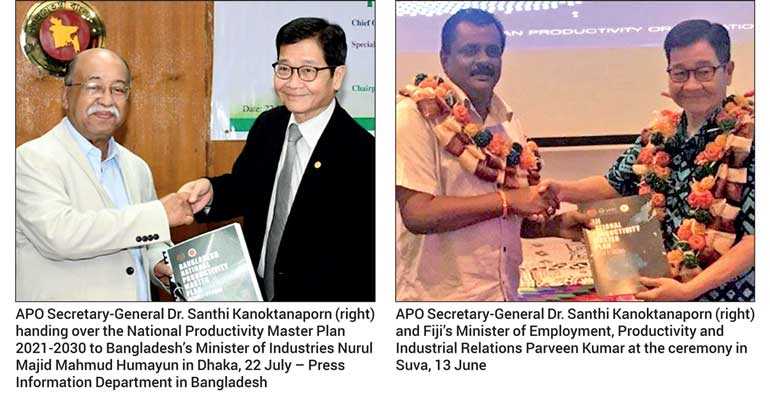Saturday Feb 21, 2026
Saturday Feb 21, 2026
Tuesday, 30 July 2019 00:36 - - {{hitsCtrl.values.hits}}

The Asian Productivity Organization (APO), under a special cash grant from the Japanese Ministry of Foreign Affairs (MOFA), has drafted national productivity master plans for Bangladesh and Fiji.
The master plans were released to the Ministry of Employment, Productivity and Industrial Relations of Fiji on 13 June and to the Ministry of Industries of Bangladesh on 22 July 2019. Workshops were subsequently organised on 14 June in Suva and 23-25 July in Dhaka to orient representatives of key institutions on the plan contents and how they can be put into practice.
During the handover ceremony in Dhaka on 22 July, APO Secretary-General Dr. Santhi Kanoktanaporn stated that the agility-productivity-innovation nexus should form the core of national sustainable productivity initiatives. He emphasised that productivity itself was “never enough in a world of constant change and uncertainty” and that the Governments of Bangladesh and Fiji needed to become resilient to achieve sustainability while meeting their national development goals.
The focus of the master plan initiative is tailoring efforts to meet the current and future needs of individual members, while expanding the APO’s policy advisory services. After consultations with government units at various levels and thorough review by key stakeholders, the master plans can be adopted as part of national productivity policies or used as drafts for the development of future guideline documents.
The Asian Productivity Organization (APO) is an intergovernmental organisation committed to improving productivity in the Asia-Pacific region. Established in 1961, the APO contributes to the sustainable socioeconomic development of the region through policy advisory services, acting as a think tank, and undertaking smart initiatives in the industry, agriculture, service, and public sectors. The APO is shaping the future of the region by assisting member economies in formulating national strategies for enhanced productivity and through a range of institutional capacity-building efforts, including research and centres of excellence in member countries.
The current APO members are: Bangladesh, Cambodia, Republic of China, Fiji, Hong Kong, India, Indonesia, Islamic Republic of Iran, Japan, Republic of Korea, Lao PDR, Malaysia, Mongolia, Nepal, Pakistan, Philippines, Singapore, Sri Lanka, Thailand, and Vietnam.